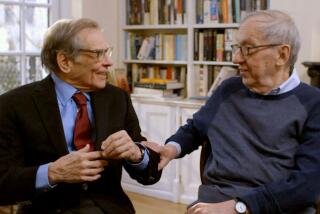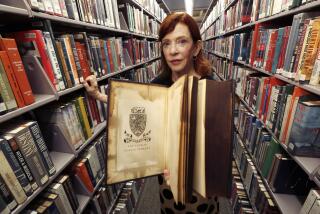A Labor of Love: Great Works on the Net
- Share via
Michael Hart, who breezed through the University of Illinois in only two years, graduating first in his class, sat down at the school’s computer in 1971 and began typing.
“When in the Course of human events, it becomes necessary for one people to dissolve the political bands which have connected them with another . . . .”
When Hart finished transcribing the “Declaration of Independence” into the big Xerox mainframe (the copier company was also in the computer business back then), he sent the document to everyone hooked up to the university’s computer network.
It was the start of Hart’s dream to create a digital library of great works that would be accessible to anyone with a computer.
More than 25 years later, he’s still at it. He and a worldwide group of volunteers have entered 1,152 printed documents, so far, into his electronic library. Only a tiny number of them are as short as Thomas Jefferson’s historic declaration. Many are full-length books, including Charles Dickens’ “The Pickwick Papers,” Jane Austen’s “Emma,” Joseph Conrad’s “Heart of Darkness,” Henry James’ “The Ambassadors,” W.E.B. Du Bois’ “The Souls of Black Folk,” and the complete poems of William Blake.
Hart’s dream project, named “Project Gutenberg Electronic Public Library” for obvious reasons, is available to anyone with access to the Internet. And although it can be reached on the World Wide Web at https://www.promo.net/pg, Hart mostly shuns the Web’s ability to carry graphics, animation and sound.
For him, the printed word is what’s truly important. His goal, as stated on the site, is to have 10,000 books on “Project Gutenberg” by the end of 2001.
There is not a great deal of explanation on the site as to why Hart has devoted himself to this venture. The home page includes only one line to describe the project: “Fine Literature Digitally Re-Published,” and a one-sentence rallying cry: “Break down the bars of ignorance and illiteracy!”
Hart is not one to waste digital words and, indeed, it would be hard to imagine he would have to convince anyone of the value of an electronic library available anywhere the Internet can be accessed.
In the spirit of his first entry, “Project Gutenberg” also makes available the Bill of Rights, the Mayflower Compact, Abraham Lincoln’s first inaugural address and the entire text of the U.S. Constitution.
The first novel to be included was Lewis Carroll’s “Alice in Wonderland,” followed by several works by the same author and then Herman Melville’s “Moby Dick.”
There are short stories, the complete works of Shakespeare, and nonfiction works as diverse as Darwin’s “Voyage of the Beagle” and all volumes of the “Decline and Fall of the Roman Empire.”
All the works on the project are in the public domain, government documents or recent works by authors who have given permission for their writings to be included.
The topic Hart does discuss at length on the site is the state of copyright law. In the United States, works pass into the public domain 50 years after the death of the author. There is a bill in Congress that seeks to increase that to 70 years. Not surprisingly, Hart is passionately opposed to it.
He and others on the project are also looking for volunteers and proofreaders.
I’ve never been a great fan of reading long works on a computer screen, but an electronic library has obvious advantages. Literature in electronic form can be easily searched. And, of course, these works can be downloaded and printed out, although a loose bunch of typing paper is less graceful to hold or carry about than a book.
But from now on, whenever someone starts trashing the Web, I plan to mention “Project Gutenberg.” It’s the Internet at its most noble.
*
Cyburbia’s e-mail address is david.colker@latimes.com.
More to Read
Sign up for our Book Club newsletter
Get the latest news, events and more from the Los Angeles Times Book Club, and help us get L.A. reading and talking.
You may occasionally receive promotional content from the Los Angeles Times.










